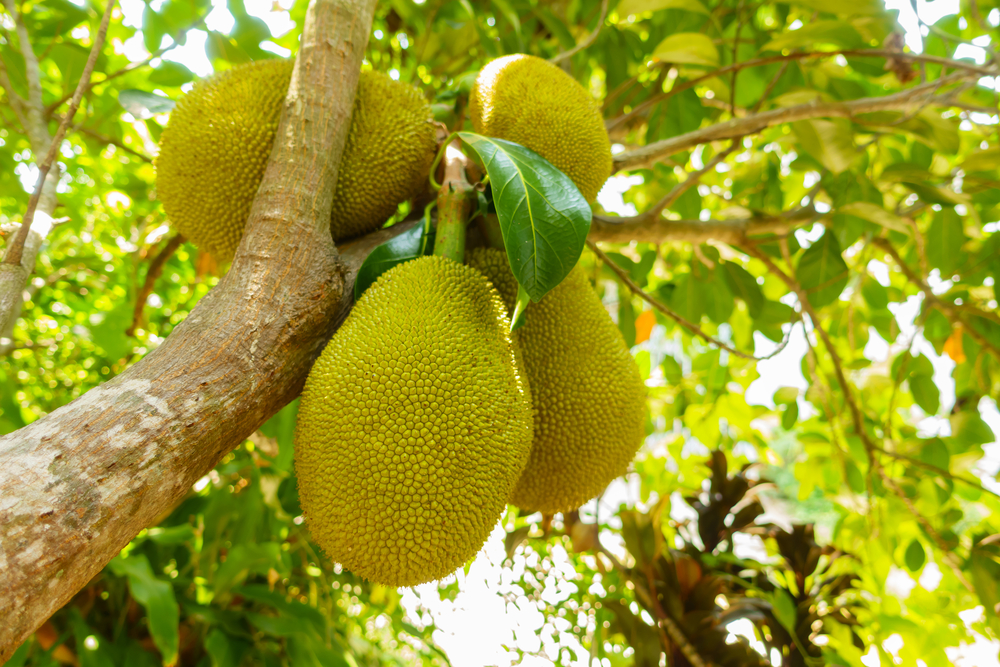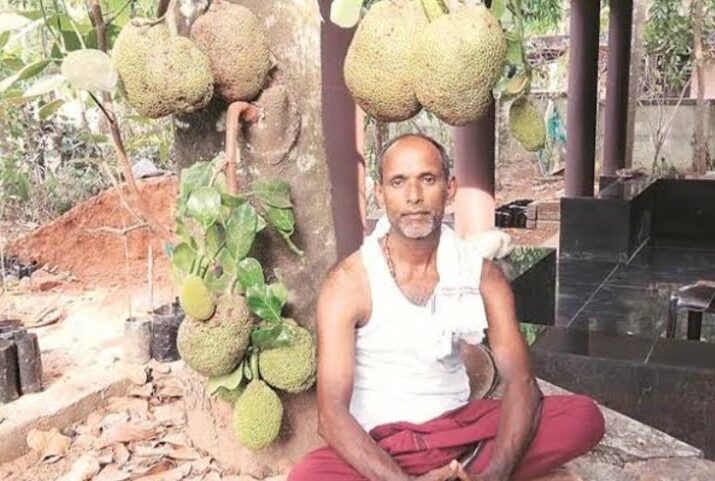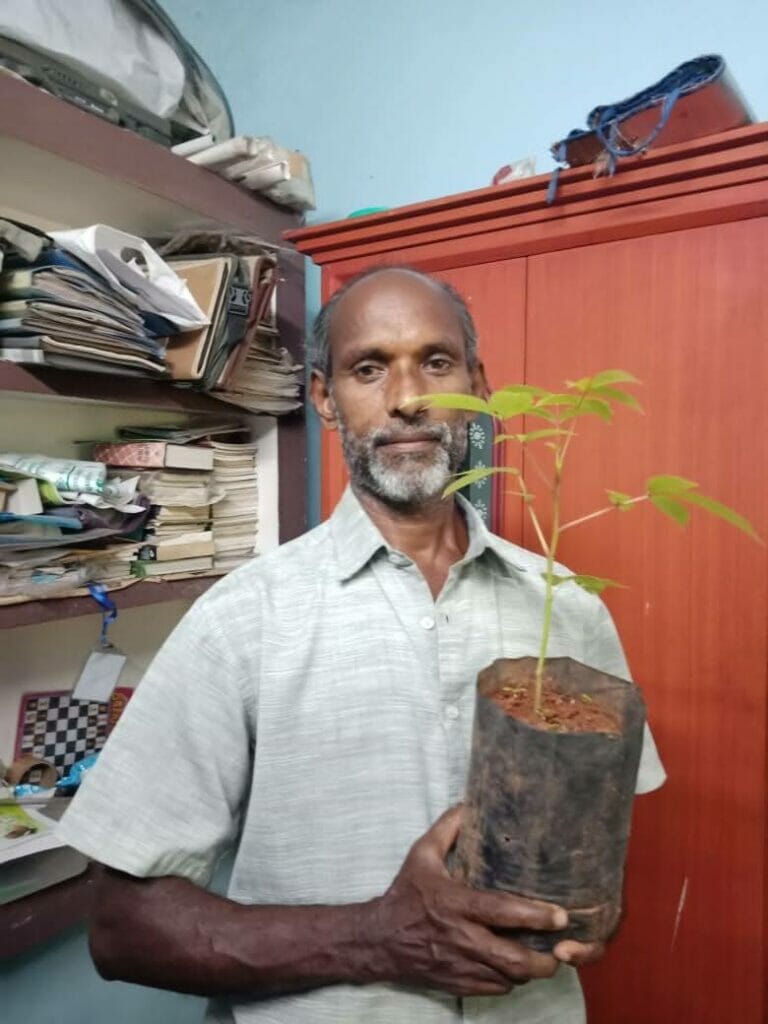The Man Conserving Jackfruit Diversity in India
A modern-day Johnny Appleseed, ‘Jackfruit Jayan’ has planted more than 20,000 jackfruit seedlings.
The Man Conserving Jackfruit Diversity in India
A modern-day Johnny Appleseed, ‘Jackfruit Jayan’ has planted more than 20,000 jackfruit seedlings.

Jackfruit is has been an important part of India's diet for centuries.by Chockdee Permploysiri, Shutterstock.
When he was just 11 years old, K.R. Jayan—who lived in the tiny village of Irinjalakuda in Kerala, a state in South India—was tasked by his teacher to engage in a socially useful activity, such as planting a tree, in honor of Mahatma Gandhi’s birthday. Most students in his class brought a flowering plant. Jayan brought a jackfruit seedling, which caused his classmates to tease him, calling him “Plavu Jayan,” which translates to “Jackfruit Jayan.” The nickname stuck, and Jayan’s tryst with jackfruit would blossom even more in the years to come.
Jackfruit, which is native to South India, is widely grown in tropical and subtropical parts of the world, including Malaysia, Central and Eastern Africa, the Caribbean, Brazil, Australia, Puerto Rico and many Pacific Islands. At one point, jackfruit was considered an inferior food, but it’s found new popularity as the global demand for plant-based nutrition has increased, with the fruit now embraced by chefs and home cooks as an excellent pork substitute.
Back in its home country, jackfruit has been an important part of the national diet for centuries. In India, jackfruit is enjoyed both in its raw form, eaten as a fruit, as well as cooked, such as in a curry. The plant’s leaves are used to wrap food during steaming. It’s featured in other local dishes, including jackfruit jam, payasam (a dessert made with milk) and jackfruit chips.

“As a child with eight siblings and a large family with very little land and income, we subsisted on the fruits of a huge jackfruit tree in our garden,” says Jayan. “We even fed our goats with the leaves from the tree.”
The importance of jackfruit started to slowly fade away after many people from South Indian states began migrating to the Gulf countries in search of better opportunities in the 1960s. With their increased earnings, the migrants built huge palatial homes and sent cash home to their families. But they gradually lost touch with the natural coconut and jackfruits the lands provided, causing “jackfruit trees [to fade] from our landscapes,” says Jayan.
One of the many people who moved to the Gulf for better prospects, Jayan worked in a supermarket in Dubai from 1995 to 2006. “But I was not happy working there,” he says. “I needed the soil and greenery and missed my connection with nature. So I moved back [home] to Kerala, which is green, lush and called ‘God’s own country.’”
Upon his return, Jayan noticed how few jackfruit trees remained around the villages, and his younger passion for the fruit was reignited. “The jackfruit is a wonderful plant. Not only the fruit but every part of the tree is useful,” he says. “The fruit, of course, is packed with minerals like iron, potassium and calcium. The timber is used for building and furniture and the seeds have anti-cancer properties. The powdered bark is used for treating swellings on legs. The jackfruit tree’s roots used to buttress the soil and prevent landslides and floods, which have become so common in recent years.”
Jayan set out to conserve the fruit himself, collecting seeds from home gardens and orchards, as well as researching different varieties of the tree, such as the Muttom Varikka, a firm-fleshed variety with a sweet scent, and Thenvarikka, which produces one of the sweetest varieties of jackfruit. The average jackfruit weighs about 15 to 20 pounds, while those on the large side can clock in as high as 55 pounds. The biggest fruit that Jayan has harvested, a variety called Muttom Varikka, weighed a whopping 122 pounds.

Wanting to replicate the trees as closely as possible, Jayan always preferred to collect seeds to grow from seedlings as opposed to grafting branches from one tree onto another, which he finds to be an “artificial” method. When planted from seed, it can take anywhere between five and eight years for a jackfruit tree to bear fruit. But when planted this way, the tree can live for up to 150 years. “Though grafting is a quicker process and may bear fruit within three years, the tree lives only up to eight years,” explains Jayan.
Jayan’s jackfruit-planting obsession quickly took off. “As I did not have land of my own, I started planting these seedlings in road sides, near railway stations and on college campuses. Many people thought I was mad, with my obsession with the fruit,” he says.
By then, Jayan already had a wife and kids and needed to find some way to support his family. So he got a three-wheeler auto rickshaw and used it to travel from village to village selling soaps, incense and candles made by local women’s self-help groups. The journeys presented new opportunities to plant more trees. “I used to carry the jackfruit seedlings and plant them on empty plots along roadsides. I would water them and nurture them, happy to see them grow and produce fruits,” he says.
To date, Jayan has planted more than 20,000 jackfruit seedlings and has cultivated as many as 23 different varieties. In India, “Jackfruit Jayan” has been celebrated for his individual efforts to diversify jackfruit plantings. In 2019, he was recognized by the prestigious Plant Genome Saviour Community Awards. He has been invited to visit colleges and the Raj Bhavan, the official residence of the Governor of Kerala, to plant jackfruit seedlings. He has even planted jackfruit trees at Gandhi’s Sevagram Ashram in Maharashtra, where the influential leader lived and worked for many years. Jayan has also written two books on the importance of the fruit, both titled Plavu, that are used by school students.
Many people with land still approach Jayan to create jackfruit orchards and he willingly obliges. “I supply seedlings to people who want them free of cost,” he says.
In the future, Jayan wishes to see more people plant orchards of biodiversity, not only of jackfruit but also other trees such as coconut and tamarind. “My vision is to create forests of jackfruit, a fruit which can feed the hungry and prevent soil erosion and slowly extend this across the country,” he says. “Nothing gives me more pleasure than to see a tree grow from a seedling and bear fruit.”
Follow us
This work is licensed under a Creative Commons Attribution-NoDerivatives 4.0 International License.
Want to republish a Modern Farmer story?
We are happy for Modern Farmer stories to be shared, and encourage you to republish our articles for your audience. When doing so, we ask that you follow these guidelines:
Please credit us and our writers
For the author byline, please use “Author Name, Modern Farmer.” At the top of our stories, if on the web, please include this text and link: “This story was originally published by Modern Farmer.”
Please make sure to include a link back to either our home page or the article URL.
At the bottom of the story, please include the following text:
“Modern Farmer is a nonprofit initiative dedicated to raising awareness and catalyzing action at the intersection of food, agriculture, and society. Read more at <link>Modern Farmer</link>.”
Use our widget
We’d like to be able to track our stories, so we ask that if you republish our content, you do so using our widget (located on the left hand side of the article). The HTML code has a built-in tracker that tells us the data and domain where the story was published, as well as view counts.
Check the image requirements
It’s your responsibility to confirm you're licensed to republish images in our articles. Some images, such as those from commercial providers, don't allow their images to be republished without permission or payment. Copyright terms are generally listed in the image caption and attribution. You are welcome to omit our images or substitute with your own. Charts and interactive graphics follow the same rules.
Don’t change too much. Or, ask us first.
Articles must be republished in their entirety. It’s okay to change references to time (“today” to “yesterday”) or location (“Iowa City, IA” to “here”). But please keep everything else the same.
If you feel strongly that a more material edit needs to be made, get in touch with us at [email protected]. We’re happy to discuss it with the original author, but we must have prior approval for changes before publication.
Special cases
Extracts. You may run the first few lines or paragraphs of the article and then say: “Read the full article at Modern Farmer” with a link back to the original article.
Quotes. You may quote authors provided you include a link back to the article URL.
Translations. These require writer approval. To inquire about translation of a Modern Farmer article, contact us at [email protected]
Signed consent / copyright release forms. These are not required, provided you are following these guidelines.
Print. Articles can be republished in print under these same rules, with the exception that you do not need to include the links.
Tag us
When sharing the story on social media, please tag us using the following: - Twitter (@ModFarm) - Facebook (@ModernFarmerMedia) - Instagram (@modfarm)
Use our content respectfully
Modern Farmer is a nonprofit and as such we share our content for free and in good faith in order to reach new audiences. Respectfully,
No selling ads against our stories. It’s okay to put our stories on pages with ads.
Don’t republish our material wholesale, or automatically; you need to select stories to be republished individually.
You have no rights to sell, license, syndicate, or otherwise represent yourself as the authorized owner of our material to any third parties. This means that you cannot actively publish or submit our work for syndication to third party platforms or apps like Apple News or Google News. We understand that publishers cannot fully control when certain third parties automatically summarize or crawl content from publishers’ own sites.
Keep in touch
We want to hear from you if you love Modern Farmer content, have a collaboration idea, or anything else to share. As a nonprofit outlet, we work in service of our community and are always open to comments, feedback, and ideas. Contact us at [email protected].by Kalpana Sunder, Modern Farmer
November 3, 2021
Modern Farmer Weekly
Solutions Hub
Innovations, ideas and inspiration. Actionable solutions for a resilient food system.
ExploreExplore other topics
Share With Us
We want to hear from Modern Farmer readers who have thoughtful commentary, actionable solutions, or helpful ideas to share.
SubmitNecessary cookies are absolutely essential for the website to function properly. This category only includes cookies that ensures basic functionalities and security features of the website. These cookies do not store any personal information.
Any cookies that may not be particularly necessary for the website to function and are used specifically to collect user personal data via analytics, ads, other embedded contents are termed as non-necessary cookies.